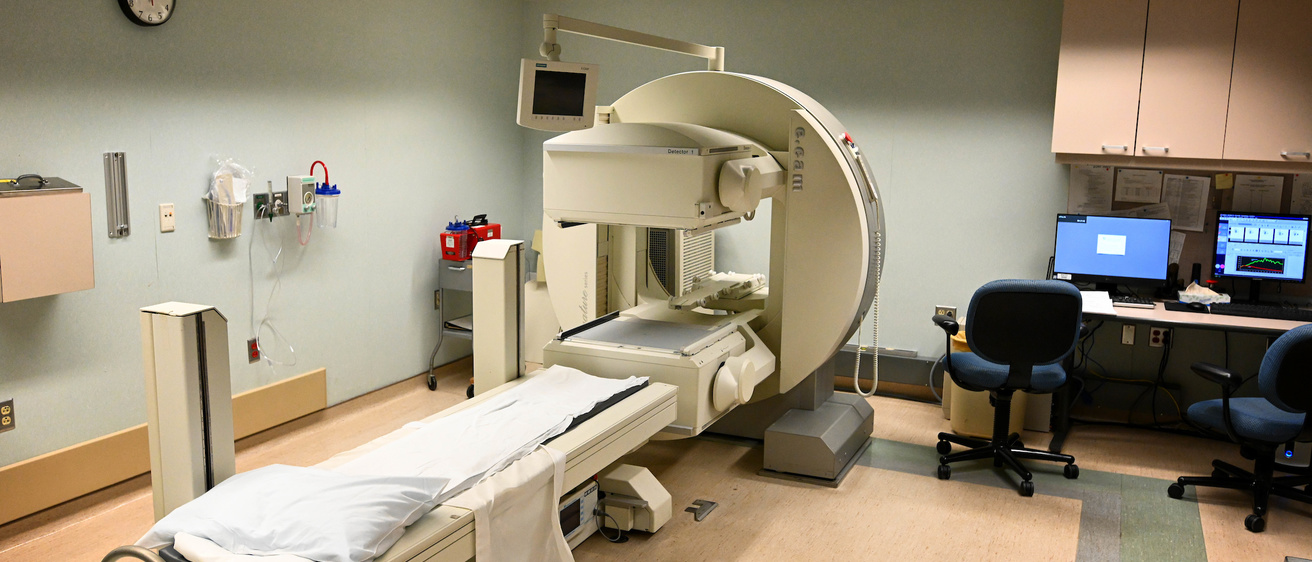Nuclear medicine technologists are professionals in a medical specialty that uses radioactive tracers for diagnostic, therapeutic, and research purposes. They work hand in hand with nuclear medicine physicians, health physicists, radio pharmacists, and radiochemists as members of highly trained specialty teams.
They usually work in hospitals, where they use sophisticated detectors and computers to follow the movement and localization of radioactive tracers in the human body. Their responsibilities may include radiation safety, quality control, radiopharmaceutical preparation and administration, and collection and preparation of biological specimens to measure levels of hormones, drugs, or other components.
Iowa’s renowned health sciences campus offers invaluable learning opportunities for students in the Nuclear Medicine Technology (NMT) Program. Iowa’s program is fully accredited by the Joint Review Committee on Educational Programs in Nuclear Medicine Technology.
You'll have access to the world-class teachers, researchers, and facilities of the university's Carver College of Medicine and University of Iowa Hospitals and Clinics (UIHC), one of the nation’s largest public university teaching hospitals.
Iowa also offers related undergraduate degree programs in Radiation Sciences.
Students interested in this major need to meet the requirements for admission to the College of Liberal Arts and Sciences.
Admission to the nuclear medicine technology BS degree program is highly competitive. The program admits a maximum of eight students per year.
Admission to the program requires first completing 60 semester hours of course work in another BS degree program, such as biology or chemistry. Review our Areas of Study to choose a major.
If you intend to apply to the NMT program, consult with the program’s adviser to plan your preprofessional study.
Admission to the NMT Program
Students planning to apply to the NMT program should be working toward a Bachelor of Science degree and must complete the following:
- At least 60 hours of college course work with a cumulative GPA of at least 2.50
- Introductory science courses in chemistry (including laboratory), physics, anatomy (including laboratory) and physiology. Courses in biology, statistics, and computer science are also highly recommended.
- Intermediate-level algebra
- Medical terminology
- Elementary psychology
- Courses in rhetoric and culture, society and the arts
Review the Nuclear Medicine Technology Program website for more details about admission requirements and how to apply. Completing the minimum requirements does not guarantee acceptance to the program.
Information
Iowa graduates have a 95 percent job/grad school placement rate within six months of graduation. Our Pomerantz Career Center offers multiple resources to help students find internships and jobs.
Iowa’s NMT program has an outstanding record of job placement. Graduates typically work as nuclear medicine technologists, beginning as entry-level staff at hospitals or clinics. With experience, many earn advanced degrees in areas such as radiation biology, health physics, or medicine. Some work in the private sector as sales or marketing specialists in nuclear medicine.
NMT graduates also find career opportunities in education as instructors, coordinators, or program directors; and in administration, industry, or research and development. Those pursuing government-related jobs might find positions as regulatory agency inspectors or radiation safety officers. Review Career Information and Outlook on the program's website for more details.
In addition to more than 500 Student Organizations, Iowa students choose from more than 100 Study Abroad Programs, and multiple Undergraduate Research Opportunities.
Students in this major are encouraged to join the Radiation Sciences Student Organization and participate in numerous networking opportunities with both students and radiation sciences alumni.
The University of Iowa provides a variety of scholarships to eligible undergraduate students through the Iowa Scholarship Portal. Scholarships are available to first-year, transfer, and currently enrolled students. For additional details on scholarships for your program of study, check directly with the department or college.
The Office of Admissions and the Office of Student Financial Aid are great resources for students seeking scholarships.
Students admitted to the Nuclear Medicine Technology Program earn a BS degree. You'll complete two years of pre-clinical work in the College of Liberal Arts and Sciences and the Carver College of Medicine and a minimum of 24 months of professional clinical experience, available at University of Iowa Hospitals and Clinics (UIHC) and the Iowa City Veterans Affairs Medical Center.
As you begin working toward a BS degree, it’s best to follow a course of study that will lead to a bachelor's degree with another major, most commonly biology, chemistry, biochemistry, or microbiology. If you are not one of the eight applicants admitted to the NMT program, you’ll be able to complete a degree in your secondary area and look for a job in that field or go on to graduate school.
When you complete the requirements of the four-year NMT curriculum, you’ll receive a BS degree from the UI Carver College of Medicine. You then will be eligible to apply to take national examinations to be certified as a nuclear medicine technologist.
See Nuclear Medicine Technology in the UI General Catalog to learn more about this degree program.



